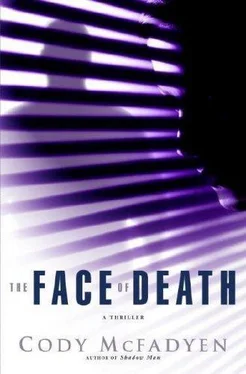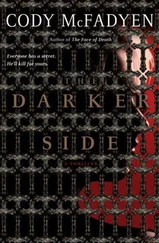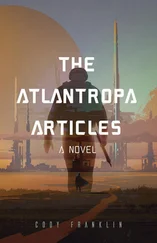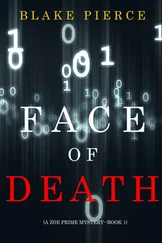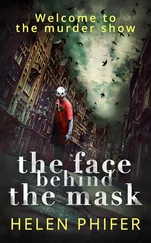"We need to be careful," I murmur. "At some point he's going to try and lead us by the nose. We need to watch out for that, challenge our conclusions."
"Yes."
I sigh. "Fine. What about Sarah? Does he end this by killing her?
Or does she get to live?"
James ponders this, staring up at the ceiling. "I think," he says,
"that it all depends on how successful he is in his goal to make her over in his own image, and then, how much he identifies with her as a result. Is she really him? If so, does he let her live, suffering, or does he perform a mercy killing? I'm not sure."
"I'm arranging for her to be protected."
"Advisable."
I tap my fingers on the desk. "Based on the Vargas video, the motive, the scars on his feet, I'm going with the following: He was a victim of commercial-level child trafficking, resulting in heavy physical and sexual abuse. This occurred over a long period, and now that he's grown up, he's pissed and he's working to make things right. So to speak."
James shrugs. "It's plausible. At least some aspects of it, I think, are true. It's a shame, really."
"What's that?"
"You saw the Russian girl. She was broken. Nothing substantial left inside. Our perpetrator, though--he's not broken, not at all. It means he started out strong. The basic building blocks were tough ones."
"In the biggest picture, he's broken too. But I understand what you're saying. Anything else you can think to add?"
"Just one thing. You asked me if there was anything probative about the diary. Obviously, most of it's true, or her version or view of the truth, but--"
"Wait. Tell me why you think that. Why you believe it."
"Simple logic. We're accepting as a known that Sarah Langstrom is not the doer in the Kingsley murders. Fine. This girl spends the last few months writing about a lunatic who kills the people around her and then it actually happens ? The odds of that being a coincidence are beyond astronomical. In light of the Kingsley killings, Sarah's story only makes sense if at least some part of it is true--unless she can see the future."
I blink. "Right. Makes sense. You were saying?"
"I was saying that while I believe in most of her story, there's something missing. I can't quite put my finger on it, but something, some aspect of her story, is bothering me."
"You think she's lying about something?"
He sighs, frustrated. "I can't say that. It's just a feeling. I'm going to be rereading it. If I figure it out, I'll let you know."
"You should trust that feeling," I say.
He gets up to leave. He stops at the door. Turns to me.
"Have you figured out what Sarah is for us?"
I frown. "What do you mean?"
"What Sarah represents to us. We know how The Stranger sees her, she's his sculpture. A creation made of pain for the purpose of vengeance. But she's something for us too. I realized it last night. I was wondering if you had."
I stare at him, searching for an answer.
"Sorry," I say. "I don't know what you're talking about."
"She's Every Victim, Smoky. You read her story and that's what you get: She's every victim we've ever failed to save. I think he knows that. That's why he's dangling her in front of us. He's holding her just out of reach and making us watch her scream."
He exits, leaving me dumbfounded.
He's right, I see that. It fits with my own sense of things. I'm just surprised that James cares enough to see it himself. Then I remember James's sister, and I wonder about what he said, and about the depth of feeling required to come to that conclusion. Rosa was a victim he failed to save.
Is that the real reason James is always so disagreeable? Because he couldn't stop caring about the death of his sister?
Maybe.
Regardless, he was right, and his observation dictated even more caution from us.
Sarah wasn't just The Stranger's revenge--she was his bait.
32
"I'M GOING TO SEE AD JONES," I TELL CALLIE AS I EXIT MY OFFICE.
"Come with me."
"Why?"
"The trafficking case? It turns out he was involved."
"You don't say?"
"Cross my heart and you know the rest."
I am back in that windowless office, seated with Callie in front of the gray megalith AD Jones calls a desk.
"Tell me about the case," AD Jones says without preamble. "In particular, talk to me about Jose Vargas."
I launch into a recap of everything that's happened up to this point. When I'm done, AD Jones leans back, staring at me while he taps his fingers on the arm of his chair.
"You think this perp--The Stranger--is an abused kid from Vargas's past?"
"It's the current working theory," I say.
"It's a good theory. The scarring on the feet of the perp and the Russian girl? I've seen that before."
"You said you were involved in the trafficking case that Vargas was suspected of participating in."
"Yep. I was on the task force in 1979, directly under the agent-incharge, Daniel Haliburton." He shakes his head. "Haliburton was a fixture here, a dinosaur, but a great investigator. Tough. I was new, just two years out of the academy. It was a messy case. Real bad stuff. I was excited anyway. You know how it is."
"Yes, sir."
"LAPD Vice had experienced a spike in child hookers and kiddie porn. It was always an ongoing problem, but this was different. They noticed a lot of these kids shared commonalities."
"Let me guess," Callie says. "Scarring on the feet."
"That was one of them. The other was that none of them came from the US. They were predominately South American, some were European. We guessed the Europeans were being routed through South America and then up here into the States."
He pauses, looking off into the past.
"Most of the victims were girls, but there were some boys too. They ranged in age from seven to thirteen, none older. All of them were in bad shape. Many of them were suffering from multiple STDs, unhealed vaginal and anal tearing . . ." He waves a hand. "You get the idea. Suffice to say, it was the kind of case that makes an impression on people."
"The only good thing about pedophiles," I say, "is that they're universally hated."
"Yeah. So the LAPD called us in. No one cared about credit or PR
or politics. It was refreshing. We formed a task force, they did the same, and it was a full-court press." A faint smile. "That meant different things back then than it does now. Ethical debate in law enforcement was a little more . . . fluid."
"I take it you mean--hypothetically speaking, of course--that suspects were questioned in an overly aggressive manner."
His smile is grim. "That's one way to put it. 'Patient presented with unexplained brusing.' Like that. Not my thing, but"--he shrugs, pained--"Haliburton and his buddies came from a different time.
"The traffickers were smart. One point of contact. Money changed hands then the child changed hands. No further concourse between the buyer and the seller after that."
"How many children are we talking about?" I ask.
"Five. Three girls, two boys. That number dropped to two girls and one boy not long after we had them in protective custody."
"Why?"
"One of the boys and one of the girls had had enough. Committed suicide. So we had the children," he continues, rolling over this tragedy, wanting to get past it, "and we had the dirt who bought them. One of the girls and one of the boys were owned by a pimp, a real scumbag by the name of Leroy Perkins. That guy had a soul like a block of dry ice. He wasn't even personally into kids, he just liked the money they could bring in."
"That seems worse, somehow," I say.
"The other girl was owned by a pervert who did like kids. He generated some cash on the side by filming himself having sex with them and then selling the movies to like-minded baby-rapers. His name was Tommy O'Dell.
Читать дальше
